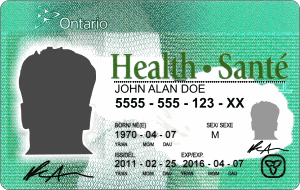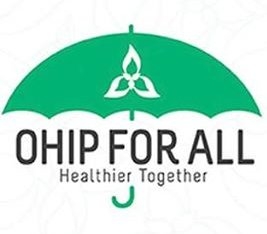The Healthcare system in Canada is renowned for its inclusiveness. In fact, for many people debating on whether or not to immigrate and settle in Canada, the lure of free health care, tips the scales in favor of it. Like most provinces, The
Ontario Health Insurance Plan (OHIP) covers all primary health care services, like consultations, laboratory tests, imaging and emergency care. Ontario accepts approximately 40% of Canada’s immigrants albeit with a warning sign; “
Welcome to Ontario and be sure to stay healthy for the next 3 months”.

The fact that newcomers cannot avail OHIP coverage for the first
three months from their date of arrival is a bitter pill to swallow. Ontario, along with Quebec and British Columbia imposes this waiting period for provincial health care coverage. From the government’s perspective they are totally justified in imposing this wait for the following reasons.
- 1. It is imperative for the government to do the required checks for eligibility and ensure that coverage is available only for people choosing to settle in Ontario.
- 2. A cost saving measure, it saves an estimated $90 million per year for the Ontario government.
- 3. It acts as a deterrent for people moving to Ontario only to avail free medical services. In other words, it helps discourage medical tourism.
Who need not wait
- Newborns in Ontario
- Children under the age of 16, legally adopted by eligible Ontarians
- People under the Interim Federal Health Program (refugees and those in need of protection)
- People from other provinces of Canada checking into a long-term care facility immediately or within 3 months of arriving in Ontario
Denying anybody healthcare is unreasonable. Nobody chooses to fall sick, it is unavoidable and for newcomers no health coverage means extensive costs. To escape the high costs, they usually either check into hospital emergency rooms (expensive for the hospitals and already overloaded) or overlook any health issues till such time they are eligible, which from a health perspective poses a huge threat to the entire community.

The OMA has been in constant engagement with The Ministry to eliminate the waiting time which is superfluous and feels that any immediate savings gained by not providing insurance to newcomers will subsequently be depleted due to compounding costs as illnesses can worsen over time. There is a common consensus amongst health professionals that this policy
violates the basic human right to health. But, we cannot expect any changes to the OHIP waiting period in the near future. According to
David Jensen, The Ministry of Health spokesman, “
The three-month waiting period was created to prevent fraud by confirming the residency of OHIP-eligible individuals prior to the ministry paying for their insured health services."
What are the alternatives?
The Government urges newcomers to get
private insurance before landing. Settlement agencies like
settlement.org assist and advice newcomers on the type of coverage to choose. However, private insurance is expensive, especially when you are looking for comprehensive coverage.
 Community Health Centers
Community Health Centers (CHC), sponsored by the government provide primary care health services for free to immigrants and other uninsured individuals, although the wait time for their services is significant. There are 20 such centers located in the
GTA. Costs toward diagnostic tests that are an essential part of health care, are not covered though.
Canadian Centre for Refugee and Immigrant Health Care in Toronto also provides primary health care services to refugees and immigrants.
OHIP for All, a social initiative by Ontarians is demanding the removal of the waiting period to ensure everyone regardless of their immigration status has access to health care.
Although the waiting period was imposed by the government in 1994 as a cost-cutting measure, there is no significant evidence that it actually saves money. Newcomers to Ontario would greatly benefit from the
removal of the waiting time which is a major barrier for basic health care. It will allow people to seek the right care at the right time, rather than continuing to resort to emergency departments and protect the general health and wellbeing of the community.

 The fact that newcomers cannot avail OHIP coverage for the first three months from their date of arrival is a bitter pill to swallow. Ontario, along with Quebec and British Columbia imposes this waiting period for provincial health care coverage. From the government’s perspective they are totally justified in imposing this wait for the following reasons.
The fact that newcomers cannot avail OHIP coverage for the first three months from their date of arrival is a bitter pill to swallow. Ontario, along with Quebec and British Columbia imposes this waiting period for provincial health care coverage. From the government’s perspective they are totally justified in imposing this wait for the following reasons.
 The OMA has been in constant engagement with The Ministry to eliminate the waiting time which is superfluous and feels that any immediate savings gained by not providing insurance to newcomers will subsequently be depleted due to compounding costs as illnesses can worsen over time. There is a common consensus amongst health professionals that this policy violates the basic human right to health. But, we cannot expect any changes to the OHIP waiting period in the near future. According to David Jensen, The Ministry of Health spokesman, “The three-month waiting period was created to prevent fraud by confirming the residency of OHIP-eligible individuals prior to the ministry paying for their insured health services."
The OMA has been in constant engagement with The Ministry to eliminate the waiting time which is superfluous and feels that any immediate savings gained by not providing insurance to newcomers will subsequently be depleted due to compounding costs as illnesses can worsen over time. There is a common consensus amongst health professionals that this policy violates the basic human right to health. But, we cannot expect any changes to the OHIP waiting period in the near future. According to David Jensen, The Ministry of Health spokesman, “The three-month waiting period was created to prevent fraud by confirming the residency of OHIP-eligible individuals prior to the ministry paying for their insured health services."
 Community Health Centers (CHC), sponsored by the government provide primary care health services for free to immigrants and other uninsured individuals, although the wait time for their services is significant. There are 20 such centers located in the GTA. Costs toward diagnostic tests that are an essential part of health care, are not covered though. Canadian Centre for Refugee and Immigrant Health Care in Toronto also provides primary health care services to refugees and immigrants. OHIP for All, a social initiative by Ontarians is demanding the removal of the waiting period to ensure everyone regardless of their immigration status has access to health care.
Community Health Centers (CHC), sponsored by the government provide primary care health services for free to immigrants and other uninsured individuals, although the wait time for their services is significant. There are 20 such centers located in the GTA. Costs toward diagnostic tests that are an essential part of health care, are not covered though. Canadian Centre for Refugee and Immigrant Health Care in Toronto also provides primary health care services to refugees and immigrants. OHIP for All, a social initiative by Ontarians is demanding the removal of the waiting period to ensure everyone regardless of their immigration status has access to health care.